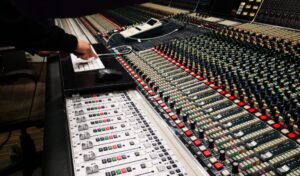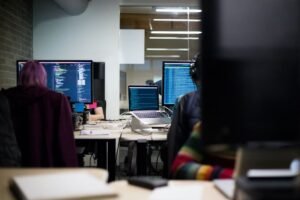Things AI Will Replace
Artificial Intelligence (AI) has made significant strides in recent years, and it is poised to revolutionize various industries by replacing tasks currently done by humans. As the technology advances, it is important to understand the areas where AI will gradually take over, freeing up human capital for more complex and creative endeavors. Here are some key areas where AI is predicted to replace human tasks in the near future.
Key Takeaways
- AI is advancing rapidly and will replace human tasks in several areas.
- Automation through AI can improve efficiency and accuracy.
- Humans will be able to focus on higher-level tasks requiring creativity and emotional intelligence.
1. Customer Service
**AI-powered chatbots** are becoming increasingly capable of handling customer inquiries and resolving issues. Scenarios that previously required human intervention, such as product recommendations or simple troubleshooting, can now be efficiently handled by AI algorithms. Although human customer service representatives will still be necessary for complex or emotional situations, AI will reduce the overall workload.
*Imagine being able to resolve mundane customer queries effectively and inexpensively.*
2. Data Analysis
Data analysis is a time-consuming task that often requires handling large datasets. **AI algorithms** can quickly process massive amounts of data, identify patterns, and generate actionable insights. By automating data analysis, companies can make faster and more informed decisions. This enables **efficient resource allocation** and **improved business strategies** based on accurate and timely information.
*Data analysis can be performed in a fraction of the time, allowing organizations to make real-time decisions.*
3. Manual Labor
AI-powered machines and robots are increasingly capable of performing physical tasks that were traditionally done by humans. From **automated assembly lines** to **warehouse operations**, machines equipped with AI can complete repetitive tasks with precision and efficiency. Industries such as manufacturing, logistics, and agriculture will witness a significant reduction in labor requirements, leading to enhanced productivity.
*Machines can tirelessly execute physical tasks, reducing the need for human workers.*
4. Transportation and Logistics
AI is making its way into the transportation sector with advancements in autonomous vehicles and **delivery drones**. Self-driving cars and trucks have the potential to revolutionize the transportation industry by minimizing accidents, improving traffic flow, and optimizing fuel consumption. Delivery drones can significantly speed up the delivery process, especially in remote or inaccessible areas.
*Picture a future where your parcel arrives at your doorstep via an autonomous drone.*
Tables
| Industry | Tasks Replaced | Benefits |
|---|---|---|
| Manufacturing | Repetitive assembly line tasks | Increased efficiency and reduced costs |
| Customer Service | Basic inquiries and troubleshooting | Improved response time and cost-effectiveness |
5. Content Creation
AI is already being used to generate written content, such as news articles and summaries. Natural Language Processing (NLP) algorithms can analyze vast amounts of data and produce coherent, human-like text. While AI-generated content may lack creativity and authenticity, it can be a valuable tool in areas such as **automated report generation** or **content summaries**.
*Imagine receiving an AI-generated summary of a lengthy report in a matter of seconds.*
Tables
| AI Application | Examples |
|---|---|
| Automated Report Generation | Financial reports, performance summaries |
| Content Summaries | Article abstracts, book summaries |
6. Healthcare
AI is transforming the healthcare industry by assisting in medical diagnosis, drug discovery, and personalized treatment plans. By analyzing large amounts of medical data, AI algorithms can identify patterns that aid in diagnosing diseases at an early stage. This can ultimately improve patient outcomes and reduce healthcare costs by **eliminating unnecessary tests** and providing tailored treatments.
*AI can help predict diseases even before clinical symptoms occur, leading to proactive healthcare.*
Conclusion
Although AI has the potential to replace certain human tasks, it is important to recognize that it is meant to augment human capabilities rather than completely replace humans. The rise of AI opens up opportunities for individuals to focus on complex problem-solving, creativity, and emotional intelligence. By leveraging the power of AI, industries can increase efficiency, improve decision-making, and adapt to the changing technological landscape.

Common Misconceptions
Misconception 1: AI will replace all human jobs
One common misconception about AI is that it will completely replace all human jobs, leading to mass unemployment. However, while AI does have the potential to automate certain tasks and reduce the need for human intervention in some industries, it is unlikely to completely replace the need for human workers.
- AI is more likely to augment human work rather than replace it entirely
- Jobs that require human creativity, critical thinking, and emotional intelligence are less likely to be fully automated
- AI may create new job opportunities as it requires skilled individuals to develop, maintain, and regulate the technology
Misconception 2: AI will become conscious and take over the world
Another misconception surrounding AI is that it will become conscious, self-aware, and eventually take control over humanity as depicted in science fiction movies. However, AI systems are designed to perform specific tasks within defined parameters and lack the ability to develop consciousness or independent thought.
- AI lacks self-awareness and consciousness
- AI systems rely on human programmers and data to function
- AI is only as capable as its programming and is unable to act beyond the scope of its design
Misconception 3: AI knows everything and can solve all problems
There is a misconception that AI possesses unlimited knowledge and is capable of solving any problem thrown at it. However, AI systems are designed to work within specific domains and their capabilities are limited to the data and algorithms they have been trained on.
- AI systems are trained on specific data and are not inherently knowledgeable about all subjects
- AI relies on accurate and unbiased data to generate reliable results
- AI may struggle with abstract and complex problems that require human intuition and contextual understanding
Misconception 4: AI will always make the right decisions
It is often assumed that AI will always make correct decisions and be free from bias. However, AI systems are prone to biases in their training data or algorithms, which can lead to incorrect or unfair outcomes.
- AI models can amplify existing biases present in the data they train on
- AI-based decisions are influenced by the quality and diversity of the training data
- AI models require careful monitoring and evaluation to ensure fair and accurate decision-making
Misconception 5: AI will replace human relationships and social interactions
There is a misconception that AI will replace human relationships and social interactions, leading to a loss of empathy and personal connections. However, while AI can enhance certain aspects of our lives, it cannot replicate the complex emotions and social bonds that humans experience.
- AI lacks emotional intelligence and empathy
- Human connections and social interactions involve a wide range of nuanced emotions that AI cannot fully comprehend
- AI may provide tools for communication and connection, but it cannot replace the depth of human relationships

Artificial Intelligence Replacing Traditional Jobs
Artificial Intelligence (AI) has become increasingly advanced over the years, leading to significant changes in various industries. From automation to machine learning, AI has the potential to replace many traditional jobs. In this article, we will explore ten examples of the types of jobs that AI is likely to replace in the future, highlighting the impact it could have on the workforce.
1. Retail Store Cashiers
In the retail industry, advancements in AI technology are enabling self-checkout systems that eliminate the need for traditional cashiers. The use of computer vision and machine learning algorithms allows for accurate identification of products and seamless payment processing.
2. Customer Service Representatives
AI-powered chatbots and virtual assistants are increasingly becoming sophisticated enough to handle customer inquiries and support. These systems can understand natural language, provide instant responses, and resolve basic issues, reducing the need for human customer service representatives.
3. Manufacturing Workers
Automation through AI and robotics is transforming the manufacturing sector. With machine learning algorithms and advanced robotics, tasks that were once performed by human workers can now be completed faster, more accurately, and without the need for breaks or shifts.
4. Truck Drivers
The emergence of autonomous vehicles, driven by AI algorithms, poses a potential threat to human truck drivers. These self-driving trucks can navigate roads, optimize routes, and reduce logistics costs, making them an attractive alternative to human drivers.
5. Stock Traders
AI algorithms have the ability to analyze vast amounts of financial data and make trading decisions faster and more accurately than human traders. Automated trading systems powered by AI are already gaining popularity in the financial markets, potentially replacing the role of traditional stock traders.
6. Data Entry Specialists
The automation capabilities of AI enable the extraction of data from various sources and its direct input into computer systems, eliminating the need for manual data entry specialists. AI algorithms can recognize patterns and digitize data, reducing errors and improving efficiency.
7. Telemarketers
AI-powered voice assistants are becoming increasingly skilled in natural language processing, making them ideal candidates to replace telemarketers. These virtual agents can engage in conversations, provide information, and answer queries, eliminating the need for human telemarketing staff.
8. Customer Support Call Center Staff
Similar to chatbots for customer service, AI-powered voice assistants can handle incoming calls, offer support, and answer frequently asked questions. This technology is revolutionizing call centers, potentially reducing the need for a large customer support staff.
9. Agricultural Workers
Advancements in robotics and AI are reshaping the agricultural industry. Autonomous robots equipped with AI algorithms can perform tasks such as harvesting, planting, and monitoring crops, limiting the need for human labor in agriculture.
10. Financial Analysts
AI algorithms can process financial data, perform complex analyses, and generate insights faster and more accurately than human analysts. This technology is increasingly being utilized in the financial sector, potentially replacing some functions traditionally performed by financial analysts.
In conclusion, the rise of AI brings both opportunities and challenges to the job market. While many traditional jobs are at risk of being replaced by AI-powered automation, new roles and industries will emerge from this technological revolution. Adapting to these changes and developing skills that complement AI technology will be crucial for individuals to thrive in the future workforce.
Frequently Asked Questions: Things AI Will Replace
What is artificial intelligence (AI)?
Artificial intelligence (AI) refers to the development of intelligent systems that can perform tasks that typically require human intelligence. These systems are designed to analyze data, learn from patterns, make decisions, and interact with humans.
How is AI impacting various industries?
AI is disrupting numerous industries, including healthcare, finance, manufacturing, transportation, and customer service. It has the potential to automate repetitive tasks, improve efficiency, enhance decision-making, and create new business opportunities.
What are some examples of tasks that AI can replace?
AI can replace repetitive tasks such as data entry, manual calculations, and basic customer inquiries. It can also automate processes like inventory management, quality control, and data analysis. Additionally, AI can perform complex tasks like medical diagnosis, financial forecasting, and autonomous driving.
Will AI completely replace human jobs?
While AI has the potential to automate certain tasks and roles, it is unlikely to completely replace human jobs. Instead, AI is expected to augment human capabilities and create new job opportunities that require advanced skills in working alongside intelligent systems.
What are the benefits of AI replacing certain tasks?
The benefits of AI replacing certain tasks include increased accuracy, improved efficiency, reduced human errors, enhanced productivity, and cost savings. It allows humans to focus on more complex and creative work, driving innovation and growth in various industries.
What are the ethical considerations surrounding AI replacing jobs?
AI replacing jobs raises ethical questions related to unemployment, inequality, privacy, and the impact on human livelihoods. It is essential to ensure fairness, transparency, and inclusivity in the deployment of AI technologies to minimize negative consequences.
How can individuals prepare for the impact of AI on the job market?
To prepare for the impact of AI on the job market, individuals should focus on developing skills that are complementary to AI technologies. This includes acquiring expertise in areas such as data analysis, machine learning, problem-solving, critical thinking, and creativity.
What roles are less likely to be replaced by AI?
Roles that require high levels of human interaction, emotional intelligence, complex decision-making, and creative thinking are less likely to be replaced by AI. Jobs that involve empathy, intuition, strategic planning, and innovation are considered relatively safe from full automation.
How can businesses leverage AI to their advantage?
Businesses can leverage AI by identifying tasks that can be automated or augmented by intelligent systems. By incorporating AI technologies into their operations, they can improve efficiency, gain valuable insights from big data, enhance customer experiences, and drive innovation.
What is the future of AI and its impact on society?
The future of AI holds immense potential for transformative advancements across various sectors. While AI may have implications on job displacement and societal changes, it also offers opportunities for economic growth, improved healthcare, sustainable solutions, and enhanced quality of life.




